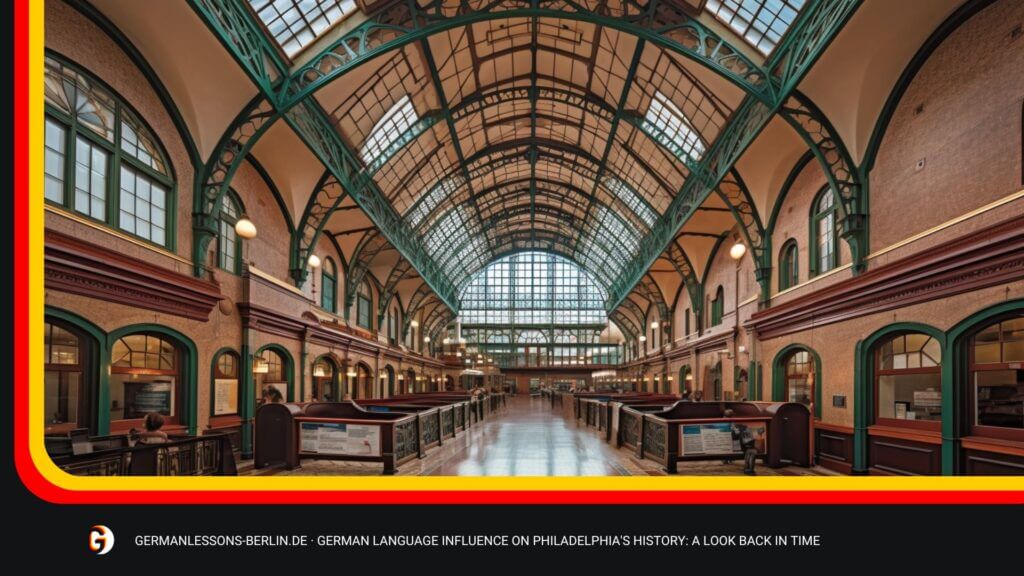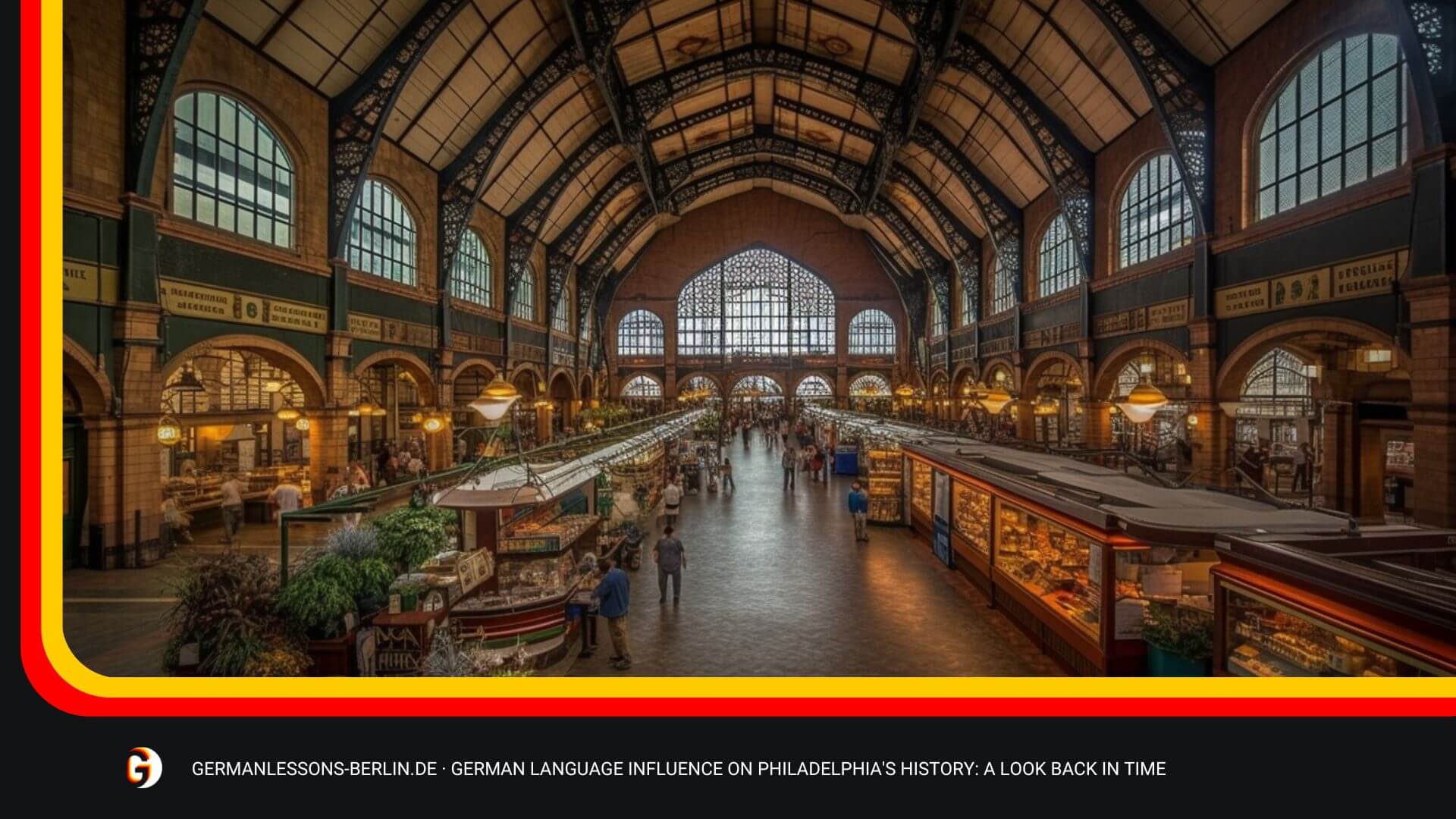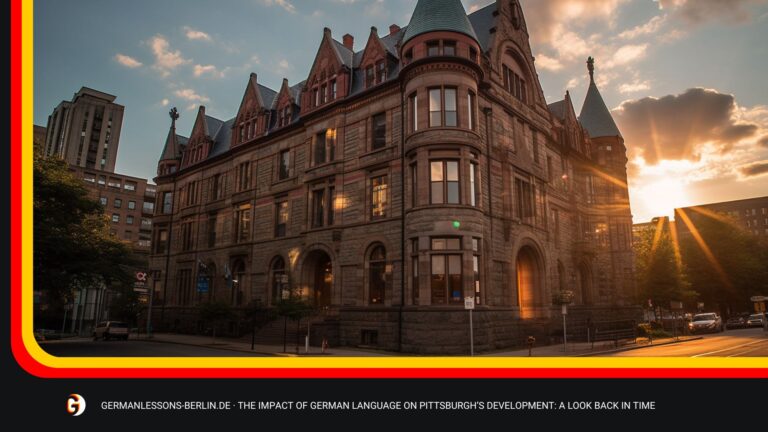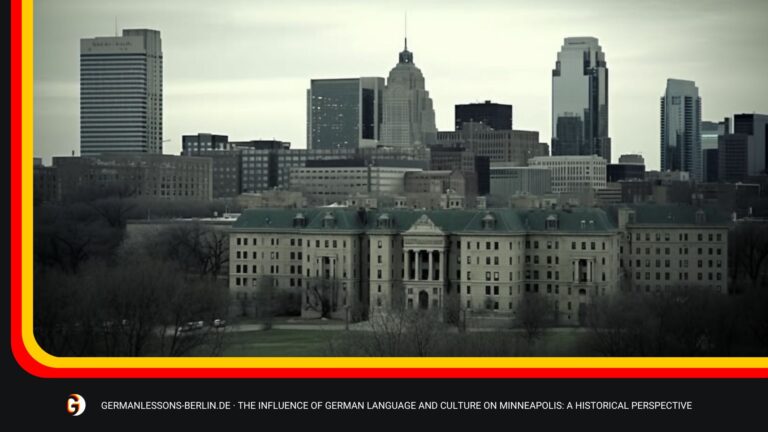Philadelphia has a long and storied history, with many influences shaping it into the city we know today. One of those is German language influence, seen in various aspects of Philadelphia’s culture and heritage. In this article, we will look back in time to explore how German has impacted Philadelphia over the years.
From its earliest days, Philadelphia was home to diverse populations from all walks of life: including Germans, who brought their language and customs to the area. We will examine how German immigrants used their language to create an identity for themselves within their new home and how they integrated their linguistic contributions into the broader society at large. Additionally, we’ll discuss other ways the German language influenced everyday life for Philadelphians throughout history.
To understand how much German impacted Philadelphia’s past, one must go beyond surface-level analysis – uncovering both direct and indirect connections between this foreign tongue and the City of Brotherly Love. Join us as we dive deep into Philly’s historical relationship with Germany – exploring stories of immigration, education, business transactions, artworks, and more!
Table of Contents
Overview Of German Immigration To Philadelphia
The influence of the German language and culture on Philadelphia’s history dates back to the 1600s when a wave of immigrants arrived from Germany. For centuries, these German immigrants continued to make their way to the city, bringing their unique customs and traditions. By the mid-1800s, Germans made up nearly one-fourth of all foreign-born settlers in Philadelphia. As a result, German was spoken widely throughout the city during this period.
At its peak, German immigration undeniably impacted almost every aspect of life in Philadelphia. From a cultural standpoint, local churches often offered services in English and German; shops stocked traditional merchandise imported directly from Germany; businesses even printed advertisements in both languages. Meanwhile, as part of their daily lives, many residents participated in various activities associated with German culture, such as singing popular folk songs or attending special events like Oktoberfest celebrations held annually around the city.
In addition to bringing new ideas and customs into the area, it is estimated that by 1860 over 35% of Philadelphians were either native-born or first-generation German speakers – making them the largest ethnic group among any major American city at that time. This influx of people affected how locals spoke and changed the dynamics of neighborhoods and business districts throughout Philly for years to come.

German-Speaking Communities In The City
As Philadelphia’s German-speaking immigrant population grew, so did its influence on the city. The influx of immigrants created a vibrant culture and established distinct neighborhoods where German was the predominant language. These areas included Northern Liberties near Spring Garden Street, Southwark near Lombard Street, Kensington along Lehigh Avenue, and Germantown around Germantown Road.
In these neighborhoods, many immigrants set up small businesses as bakers, butchers, brewers, grocers, furniture makers, and clothing merchants; some also became landowners or ran boarding houses. Moreover, they founded numerous churches, such as St Michael’s Lutheran Church in North Philadelphia, and established organizations like the Pennsylvania German Society which helped preserve their cultural heritage.
The impact of the Germans on Philadelphia extended beyond its physical landscape to its political arena; for example, during elections, it was common to hear speeches in English and German, among other languages. Today there is still evidence of their presence—from street signs with names derived from German words to festivals celebrating their history—preserved throughout the city’s historical fabric.
German Language Education Programs
The German language has had a long and influential history in Philadelphia. Many of the early inhabitants spoke primarily or exclusively German. To this day, there is still evidence of that influence throughout the city’s cultural landscape. This includes various German language education programs available to residents interested in learning more about their heritage.
Several organizations offer classes and courses on the German language and culture within Philadelphia. For example, The Pennsylvania Association for Language Learning (PALL) offers online and in-person lessons for those looking to learn or improve their fluency in the language. Other groups like The Liberty Bell Network provide tutoring services while organizing social events where students can practice conversational skills with native speakers from Germany.
In addition to these resources, universities like Temple University offer degree programs specifically tailored toward teaching German language and literature at all levels. With such an array of options available, Philadelphians have plenty of opportunities to explore the rich contributions made by Germans to the area’s unique identity. Whether one wishes to pursue further academic study or gain insight into their ancestry through casual learning experiences, there will surely be something suitable for each individual’s goals and objectives.
Languages Used In Public Records And Documentation
The German language has had an undeniable influence on Philadelphia’s history. This is seen in the public records and documentation of the city, which have been primarily written in German for centuries. The use of this language resulted from the large number of immigrants who settled in Philadelphia during its early development and their descendants who continued to speak it through subsequent generations.
In addition to being used for official documents, German was also frequently used by citizens when conversing with one another. There are many instances where two people can speak both English and German simultaneously. As such, the German language influenced daily life within the city throughout much of its history.
The impact of this linguistic influence is still visible today; from street names to monuments dedicated to those that spoke or wrote the language, evidence remains all over Philadelphia, demonstrating how important it was at one point. While other languages may now dominate some areas of communication within the city, there is no denying that with a strong foundation provided by German speakers and writers long ago, Philadelphia is what it is today.
Impact On Philadelphian Dialects And Slang
The impact of the German language on Philadelphian dialects and slang is undeniable. When the first wave of German immigrants arrived in Philadelphia, they brought their native language, culture, and customs. As they settled into Philadelphia’s neighborhoods, they began incorporating their words and phrases into everyday speech. This created a unique combination of English and German that is still heard today.
It is estimated that up to one-third of all Philadelphian dialects, today are derived from these German roots. Many common expressions locals use have direct translations from the original German phrase, such as “schmutz” for dirty or “Gemütlichkeit” for comfortableness. Other popular terms include “Schadenfreude,” which means taking pleasure in someone else’s misfortune; “kludged,” telling something made quickly but not well; and “rookie,” which refers to an inexperienced person. These terms have become commonplace among Philadelphians regardless of ethnic background due to the widespread influence of german immigrants upon the Philadelphia language over time.
There has been so much integration between English and German languages that it is sometimes difficult to distinguish where one ends and the other begins! The German influence can also be detected in many local slang words such as “Baehlen” (to bargain) and “Mudderschlopfen” (mud sloshing). Even place names like Germantown reflect the powerful presence of German immigration during this period.
Philadelphia’s long history with german immigration has undoubtedly left its mark on both language usage throughout the city and our understanding of regional identity today. The legacy lives on through countless words and phrases embedded within our daily conversations – a testament to a deep bond formed centuries ago between two distinct cultures now intertwined always.
Influence On Local Cuisine And Food Culture
For centuries, Philadelphia has been shaped by the influence of the German language and culture. This is especially evident in the city’s cuisine and food culture. Since the first waves of German immigrants to this area, many restaurants have offered classic dishes from Germany and those inspired by traditional recipes.
The abundance of eateries serving up German-style cooking makes it easy to find everything from schnitzel to strudel in Philadelphia. Many bakeries specialize in delicious pastries made with traditional ingredients such as nuts, spices, raisins, and apples. Many people flock to these authentic German establishments for their favorite treats or meals.
Since its inception, Philly’s culinary scene has been heavily influenced by the Germans who settled here centuries ago. From Sauerkraut and kielbasa to potato pancakes and spaetzle – all staples of German culinary culture – you can easily find them served all around the city today. It goes without saying that if one wants an authentically prepared meal or baked good reminiscent of ‘old country’ traditions, then t, they look no further than Philadelphia’s vast array of excellent restaurants and bakeries for which Germantown was once famous.
Preservation Of Traditional German Customs
The German immigrants who settled in Philadelphia brought a rich cultural heritage. This included traditional customs and language preserved over time, even as new generations of Germans assimilated into American society. Many German-influenced festivals, such as May Day celebrations and Christmas markets, remain popular today. Furthermore, many culinary traditions from Germany have become staples of the city’s culture. For instance, Philadelphia is home to many authentic German restaurants and pubs.
Various organizations celebrating this heritage throughout the region have aided the preservation of traditional German customs. The Pennsylvania Dutch Folklore Center holds annual events for those interested in learning about their ancestry and exploring the vibrant culture that remains alive in the Philadelphia area. Other groups work to keep local dialects alive through oral history projects or regular classes on speaking “Pennsylvania Dutch” (a form of High German). These efforts help ensure that future generations experience these essential aspects of their heritage firsthand.
In addition to providing access to a unique part of local history, preserving German customs within the community has fostered a sense of identity among its members. By understanding and embracing their cultural roots, Philadelphians are better equipped to know how they fit into more extensive conversations around immigration and assimilation nationally—as well as how this knowledge can be applied more broadly within our globalized world.
Music, Art, And Literature Scene
The German language has profoundly influenced art and literature throughout Philadelphia’s history. This is evident in many of the city’s local bands, art galleries, and literary events set up over the years.
For example, one of the most popular musical acts out of Philadelphia was The Dead Milkmen – an indie punk band whose members all spoke fluent German. Furthermore, several German-language radio stations in the area feature traditional folk music and modern rock. Additionally, some of Philly’s best jazz musicians, such as John Coltrane and Miles Davis, were also heavily influenced by German culture.
Regarding visual arts, numerous exhibitions featuring works from Germany can be found at various museums throughout Philadelphia. These include everything from classic Renaissance paintings to contemporary sculptures by leading German artists. Multiple theater troupes perform plays written in English and German, depending on their audience size and location. Finally, even today, you can find bookstores specializing in books printed initially in German or with translations into English available for purchase.
Philadelphia’s rich cultural scene owes much of its success to the strong presence of Germans, who brought along their unique style when they settled here centuries ago. From classical masterpieces to cutting-edge performance pieces, this vibrant community continues to shape the aesthetic landscape of this great American city through its diverse range of artistic expression.
Philanthropic Contributions By German Immigrants
Throughout the history of Philadelphia, German immigrants have made significant philanthropic contributions to their adopted city. From donations in supporting healthcare initiatives to local charities that deserve need, these selfless acts have helped shape the city’s culture and identity for generations. The following is a look at how German-immigrant philanthropy has benefited Philadelphia:
- Education: Numerous schools throughout the city were founded by or supported through generous donations from German-American benefactors. For instance, Frankford High School was established with financial assistance from William Foulke and other members of the large German community living in what is now known as Northeast Philadelphia. In addition, many universities, such as Temple University and Ursinus College, received grants and gifts from Germans who wanted to ensure access to higher education for all Philadelphians regardless of socio-economic backgrounds.
- Healthcare: During the 19th century, smallpox epidemics devastated cities across America; however, thanks to timely donations from wealthy families like the Bauers and Grieseds, Philadelphia’s population was spared much suffering during these periods. Moreover, funds provided by prominent citizens such as George Wiedemann allowed hospitals like St Mary’s Hospital (now part of Thomas Jefferson University) to be built on a solid foundation of medical care for every Philadelphian, regardless of economic status or race.
- Charities & Foundations: Early German settlers funded many charitable organizations to provide necessary resources for those less fortunate than themselves. One example is the Walnut Street Synagogue Foundation which supports Jewish communities around Philly; it was created after several members donated generously towards its construction shortly after it arrived in 1845. Another organization called “German Friendly Society” distributes clothing items and food subsidies annually throughout low-income neighborhoods. This effort began in 1743 when several philanthropists combined their resources under one collective mission statement. Lastly, numerous churches are still standing today due to generous endowments given by affluent individuals like Henry Kugler, whose descendants continue to give back through his namesake foundation even today!
Philanthropic efforts committed by immigrant Germans over two centuries ago remain an integral part of life here in Philadelphia today – they’ve helped build more vital educational institutions, improved public health outcomes, empowered marginalized populations with social justice opportunities, and served countless others through various charity initiatives across our great city!
Legacy Of German Language In Philadelphia Today
Philadelphia has a strong German heritage, and the language still plays a vital role in the city today. The influence of German-speaking communities on Philadelphia’s culture is evident in everything from its dialects to local cuisine, customs, and more.
| Philly Language | Food Customs |
|---|---|
| Schuylkillisch | Schneiderlein |
| East Kensington Deutsch | Brezeln |
| Germantown Dutch | Sauerkraut |
The legacy of German immigrants can be seen everywhere throughout Philadelphia. From the distinctive Philadelphian dialect known as “Schuylkillisch” to traditional food like Brezeln (pretzels) and Sauerkraut, their cultural reminders of Germany are present in today’s cityscape. For example, walk through any part of Philadelphia where Pennsylvania Germans once lived. You will find streets with names such as “Germantown Avenue” or “East Kensington Deutsch Street” that pay homage to their heritage.
German traditions also live on within the city’s various churches and social organizations. In addition, these groups help preserve old customs and serve an essential role in bringing together members of different generations who share a common history and identity. This connection allows them to pass down stories, recipes, and other pieces of knowledge, which help keep alive the memory of those early German settlers who helped shape what makes Philadelphia unique today.
Frequently Asked Questions
How Has The Influx Of German Immigrants Shaped Philadelphia’s Economy?
The wave of German immigrants that flooded Philadelphia in the 19th century left an indelible mark on its economy. Their economic influence was far-reaching, and their cultural contributions significantly impacted ty’s overall growth.
These newcomers had much to offer, from skilled labor and entrepreneurial expertise to capital for investments. The influx of Germans into Philly opened up new business development opportunities and increased the region’s investment potential. This allowed businesses to expand quickly, leading to more significant economic growth. It also created jobs that weren’t available before this period of immigration.
From financial advisors and accountants to small shopkeepers, these German immigrants were instrumental in developing Philadelphia’s commercial climate at the time. They contributed significantly to the success of many local industries by providing access to much-needed services and resources, which helped spur further economic expansion during this era. These forward-thinking individuals even paved the way for today’s thriving industries, such as finance, technology, health care, manufacturing, tourism, education, and entertainment – all of which play a vital role in Philadelphia’s current economic vitality.
Overall, without them, Philadelphia would not be what it is today: one of America’s most vibrant cities with a rich history rooted in German culture and language influence.
What Is The Status Of The German Language In Philadelphia Today?
Today, the status of the German language in Philadelphia is less prominent than it once was. However, there are still a few places where evidence of its past influence can be found. For instance, many Philadelphians today still speak some form of their ancestors’ dialectical records of German. Additionally, several schools and classes teach various aspects of the language throughout the city.
The influx of German immigrants to Philadelphia during the 19th century greatly impacted culture and society. As they settled into their new home, they brought customs and language. Before, with a theme song, most residents were conversing in at least some combination of English and German depending upon which part of town they lived in or who they associated with socially.
Though much has changed since then, traces of this linguistic heritage remain visible even today. Many older generations have continued to pass down traditional words and phrases from generational elders, while others have elected to learn more formally through books or formal instruction. This range of options allows individuals to explore how deeply rooted these influences are within our history here in Philadelphia – something that should always be celebrated and embraced by locals looking back on it all now.
What Is The Most Popular German-Influenced Cuisine In Philadelphia?
German-influenced cuisine is a popular part of Philadelphia’s culinary landscape today. From traditional German restaurants to unique fusion dishes, the city offers plenty of options for those seeking out the distinctive flavors and influences brought to Philly by its once-large population of German immigrants.
The most Philadelphia’s popular German-influenced cuisines in Phil Traditional German Restaurants – Many original German restaurants still exist in neighborhoods like Southwark, Manayunk, and Germantown. These eateries offer authentic dishes such as schnitzel, sauerbraten, and spaetzle that have been handed down through generations.
2. Fusion Dishes – Contemporary chefs draw from these classic recipes to create modern takes on traditional German dishes. Famous examples include pretzel-crusted pork chops or bratwurst tacos with tangy kraut slaw.
3. German-American Food – This style combines ingredients and cooking techniques from Germany and America, creating a unique flavor profile. Examples include beer sausage sandwiches made with quality local craft beers or pierogis stuffed with aged cheddar cheese curds.
These types of food can be found across many different kinds of establishments throughout the city—from upscale restaurants to casual pubs—and they provide a delicious way to experience the rich history of Pennsylvania’s strong connection to the culture and customs of Germany while also enjoying new twists on old favorites.
How Have German Immigrants Contributed To Philadelphia’s Culture And Arts?
German immigrants have left an indelible mark on the culture and arts of Philadelphia, with their influence still being felt. Contributions range from preserving traditional German heritage through art and music to introducing new cultural elements that changed the face of the city forever.
Within the realm of german-influenced arts, several examples as particularly influential in shaping modern Philadelphia’s culture. The most obvious is theatre; many famous plays were first produced by German immigrant directors who drew upon influences from their native land and American society to create unique works for a diverse audience. Similarly, in visual arts, numerous paintings and sculptures were created by German-born artists, which now form part of the permanent collections in some of Philly’s museums.
In terms of german-influenced culture, it would be essential to mention food. Restaurants serving traditional dishes such as sauerbraten (beef) or spätzle (noodles) can still be found throughout the city today, a testament to the lasting impact of German immigrants on local cuisine. Alongside these culinary staples are a variety of other forms of entertainment, such as biergartens offering live performances of oompah music—an example of how Germans continue to share aspects of their cultural identity with Philadelphians more than two centuries after they first arrived here.
Then, German immigrants played an integral role in establishing and maintaining certain facets of Philadelphia’s culture and history. Whether it’s through legacy preservation, introducing new ideas, or just providing something tasty to eat – their contributions remain essential parts of life in this great city even all these years later.
What Efforts Have Been Made To Preserve Traditional German Customs In Philadelphia?
Preserving traditional German customs in Philadelphia is an effort that has been ongoing for centuries. From the early days of William Penn and his Quaker followers choosing to settle in Pennsylvania, they were joined by many other ethnicities – one being Germans, who brought their own culture and traditions with them. As these immigrants blended into the fabric of Philadelphian society over time, the city slowly began recognizing its need for cultural preservation. This article will explore how efforts have been made to maintain traditional German customs within the City of Brotherly Love.
German immigrants first arrived in large numbers during the 1730s when thousands flocked from areas such as Germany’s Palatinate region, suffering from famine and religious persecution. These newcomers quickly established churches and organizations dedicated to preserving their language and customs, helping solidify their presence within Philadelphia’s ever-growing population. In addition, many of these individuals found work in industries such as textiles, carpentry, and metalworking, thereby making significant contributions to the economic sustainability of the area.
Today there are various ways through which Philadelphians can experience traditional German heritage firsthand. One example is The German Society of Pennsylvania – founded in 1764 – which hosts multiple events throughout the year highlighting both past and present aspects of German culture. Additionally, visitors can participate in activities like Oktoberfest celebrations or visit landmarks such as Christ Church Cemetery, where notable figures like Benjamin Franklin are buried side-by-side with generations upon generations of German settlers. All these things help bring people closer together while providing insight into rich customs that still live on today despite all odds.
Whether attending festivals celebrating historical achievements or visiting places that once served as hubs for immigrant communities long ago, those interested in learning about Philadelphia’s vibrant German history have plenty of options. By embracing modern initiatives alongside age-old practices passed down from previous generations, we can continue paying homage to our diverse ancestry without sacrificing any sense of identity.
Conclusion
In conclusion, German language influence has been and continues to be a significant factor in Philadelphia’s history. This is evident in the city’s economy, culture, and cuisine – all of which have significantly benefited from the influx of German immigrants.
Today, many reminders remain of the strong connection between Philadelphia and Germany. The most popular German-influenced dishes can be found on restaurant menus throughout the city, and traditional customs remain alive thanks to ongoing efforts by local communities. All this serves as an important reminder that our shared past should be remembered and noticed.
Ultimately, the impact of the German language’s influence on Philadelphia cannot be overstated – it has helped shape our present day. It will continue to do so for years to come. We owe a great deal to those who came before us, and we must never forget their contributions when reflecting upon Philadelphia’s history.
Several external resources are available to learn more about the role of the German language in Philadelphia’s history. The German Society of Pennsylvania, the Free Library of Philadelphia, and the German American Chamber of Commerce of the Mid-Atlantic all celebrate and promote Philadelphia’s German-American heritage. Additionally, Philadelphia hosts many German cultural events throughout the year, including the Philadelphia German-American Steuben Parade, which honors German-Americans’ contributions to the city. By exploring these resources and attending events, one can gain a deeper understanding of the historical and cultural significance of the German language in Philadelphia’s history.







